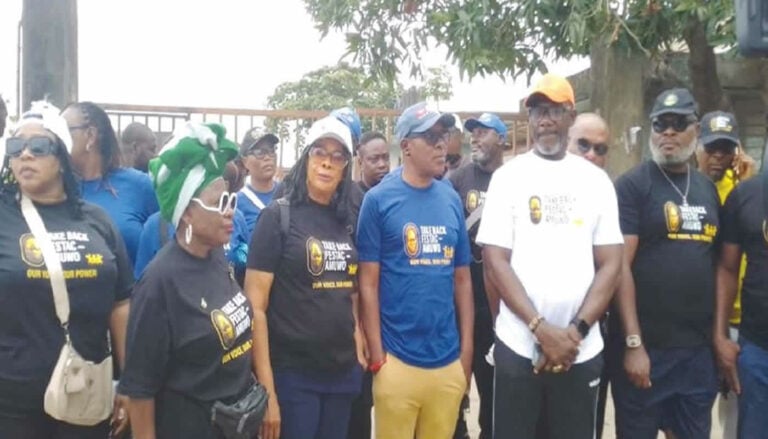Residents of FESTAC Town in the Amuwo Odofin Local Government Area of Lagos State have demanded an urgent intervention from the state and federal governments to address years of neglect in the once-celebrated housing estate.
Speaking during a protest on Saturday under the Take Back FESTAC Movement, the residents highlighted issues ranging from bad roads, blocked drainage, infrastructure decay, illegal shanties, and rising insecurity.
The protesters who marched through major avenues in the housing estate and wore shirts with bold inscriptions, such as “TakeBack FESTAC-Amuwo” and “Our Voice, Our Power,” specifically lamented the state of the roads and drainage system.
They described roads, particularly along Second Avenue, as death traps and drainage channels as completely blocked by illegal constructions and dirt.
The Chairman of the movement, who also led the rally, Valentine Uduebo, urged the government to take responsibility.
He said, “We can no longer watch FESTAC collapse before our eyes. Roads are impassable, drainage is blocked, illegal shanties have taken over, and insecurity is at its worst.
“We are calling on the Federal Housing Authority and the Federal Government to fulfill their responsibilities.
“We had something similar on July 5 precisely. And our cries, our yearnings are just very simple, we’re not asking the government to give us anything or to make life any better than it is today. All we’re asking for is the FESTAC of old, it’s pitiable that a federal institution or a federal housing estate such as FESTAC would be this dilapidating. It’s horrifying, we have so much insecurity because of the whole lot of federal government and state government absence.”
Another major grievance was the deteriorating security situation cited by the protesters as they raised the alarm that crime had been on the rise in the community.
A long-time resident who described himself simply as Charles said members of the community had since been living in fear.
He said, “FESTAC was built as a showcase of Nigeria’s potential, but today it is a shadow of itself. We live in fear, with bad roads, rising insecurity, and failed services. It is heartbreaking, and we are concerned about the sanity of the Estate.”
“Our environment is not that conducive again, like before. There are a lot of illegal structures and illegal activities. And we want to bring back the glory where everything will be done accordingly and the environment becomes conducive,” he added.
Some residents also warned that the unchecked spread of shanties has worsened insecurity and posed health and environmental risks.
They called for relocation of illegal traders to proper markets, which they claimed the newly elected local government chairman was working on.
The residents also demanded answers over the alleged sale of FESTAC Waterworks, describing the transaction as opaque, and asked the authorities to clarify their role.
“If the waterworks and other public assets are sold carelessly, how will the estate function? We need proper roads, functioning drainage, and effective policing, he added.”
An executive of the movement, Chima Williams, called on the federal and state government to support the local government chairman, saying FESTAC once harboured international bodies and propagated the heritage of this country.
“Let us not ignore FESTAC. Let us not ignore the people here. We are strong, we are resilient, and we are productive. Give us the road, give us drainage, and give us power. Since this government is the government of the people, by the people, and for the people, this is the voice of the people.”
He further added that “Logistics has made things unbearable. The cost of surviving here is expensive now, based on logistical problems. Now, if you talk about health, there is no way any ambulance will reach any sick individual on time. Security-wise, you cannot see any policeman respond to any security situation swiftly.”
The protesters, however, commended the council chairman, Lanre Sanusi, for his intervention in some areas.
They noted that the chairman, though new in office, had made efforts to clear shanties, relocate traders, and restore some order despite limited resources.
This is the second time residents have taken to the streets this year, following a similar demonstration in July 2025. The repeated protests underscore the depth of frustration within the community and the urgency for government intervention before the estate’s decline becomes irreversible.
FESTAC Town, originally conceived in the 1970s to host the Second World Black and African Festival of Arts and Culture (FESTAC 77), was built by the Federal Government as a model estate under Decree 40 of 1973. Once a showcase of Nigeria’s post-oil boom vision and home to thousands of middle-class families, it was designed as a “city within a city” with modern housing and infrastructure. However, decades of neglect by successive governments have left the estate in decay, with collapsed roads, blocked drainage, unregulated shanties, and rising insecurity.
It was earlier reported on September 15, 2025, that the Federal Housing Authority had commenced the rehabilitation of FESTAC Town with the inauguration of the reconstructed 1st Gate, 1st Avenue Road, and solar street lights, which marked the beginning of efforts to restore the estate.
When contacted on Monday, the Head of Public Relations at the Federal Housing Authority, Kenneth Chigelu, said he was not aware of the protest.
He, however, added that stakeholders had already been engaged in the rehabilitation plans of the housing estate.
He said, “If you are doing a protest, due process must be followed. You have to inform us that you are protesting, to know the grounds of the protest. We have started the rehabilitation of FESTAC, and almost every stakeholder was there; we had media coverage, the local government chairman was there too.”
The FHA spokesman specifically cited the ongoing rehabilitation of roads, gates, and agreements with the Federal Roads Maintenance Agency to fix critical infrastructure.
Chigelu maintained that anyone with grievances should write formally to the Authority for dialogue.


